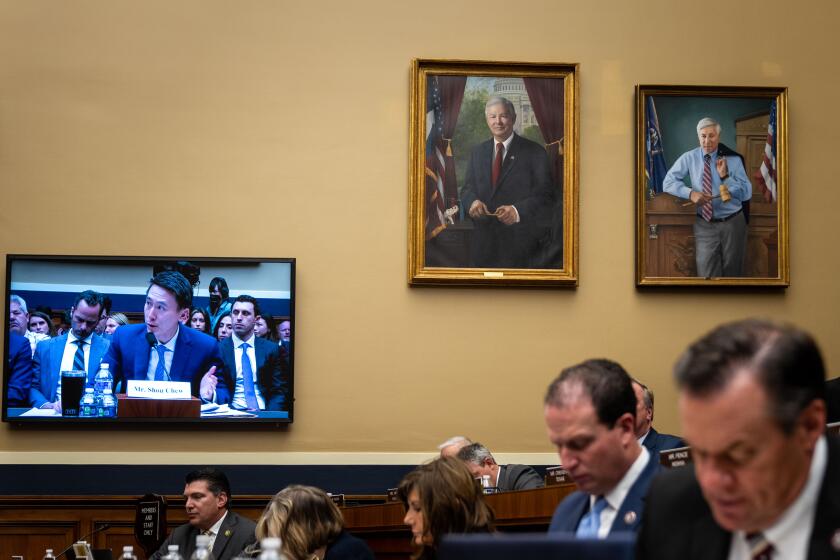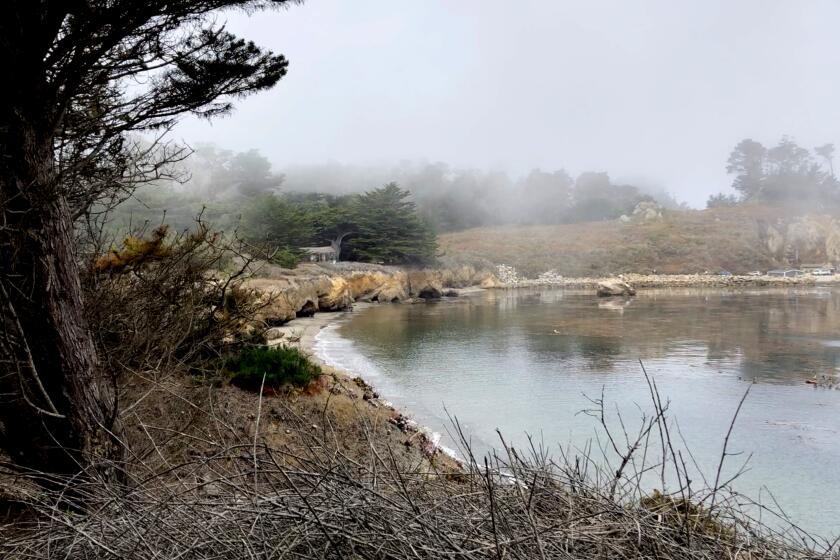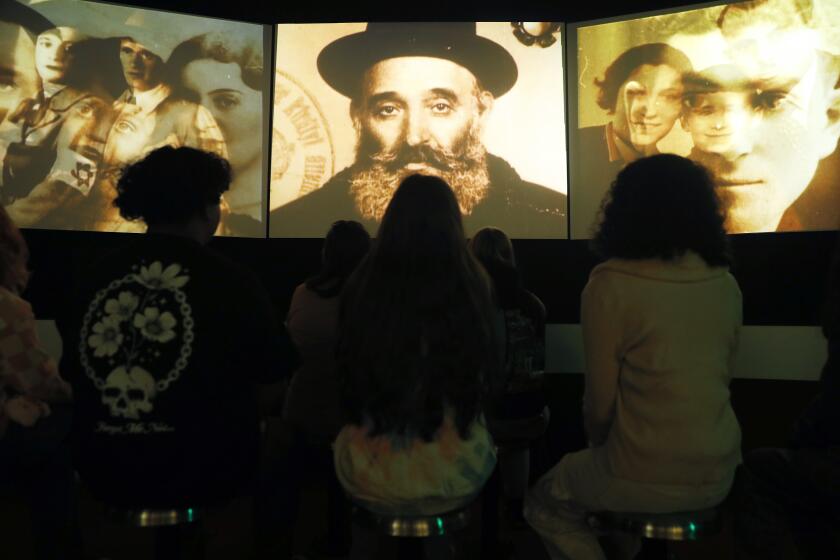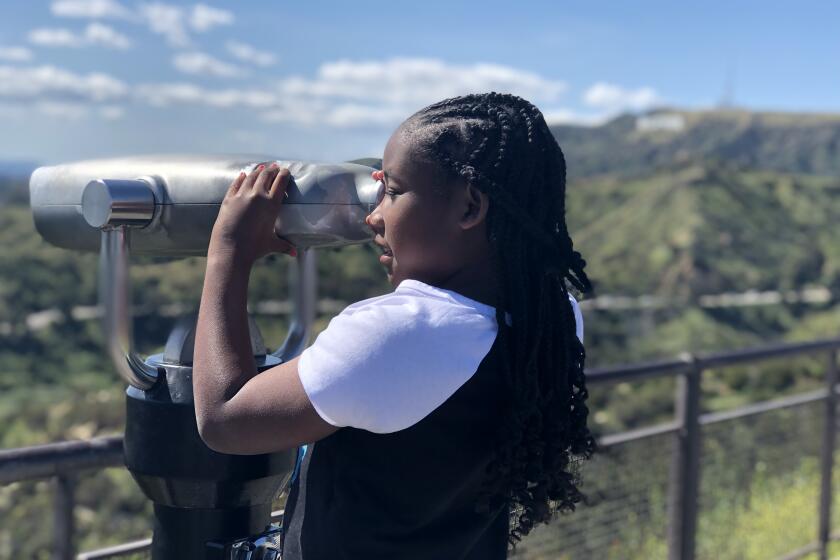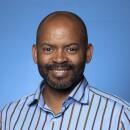As the nation wrestles with race, this ‘Asian Superstar’ uses fashion to find common ground
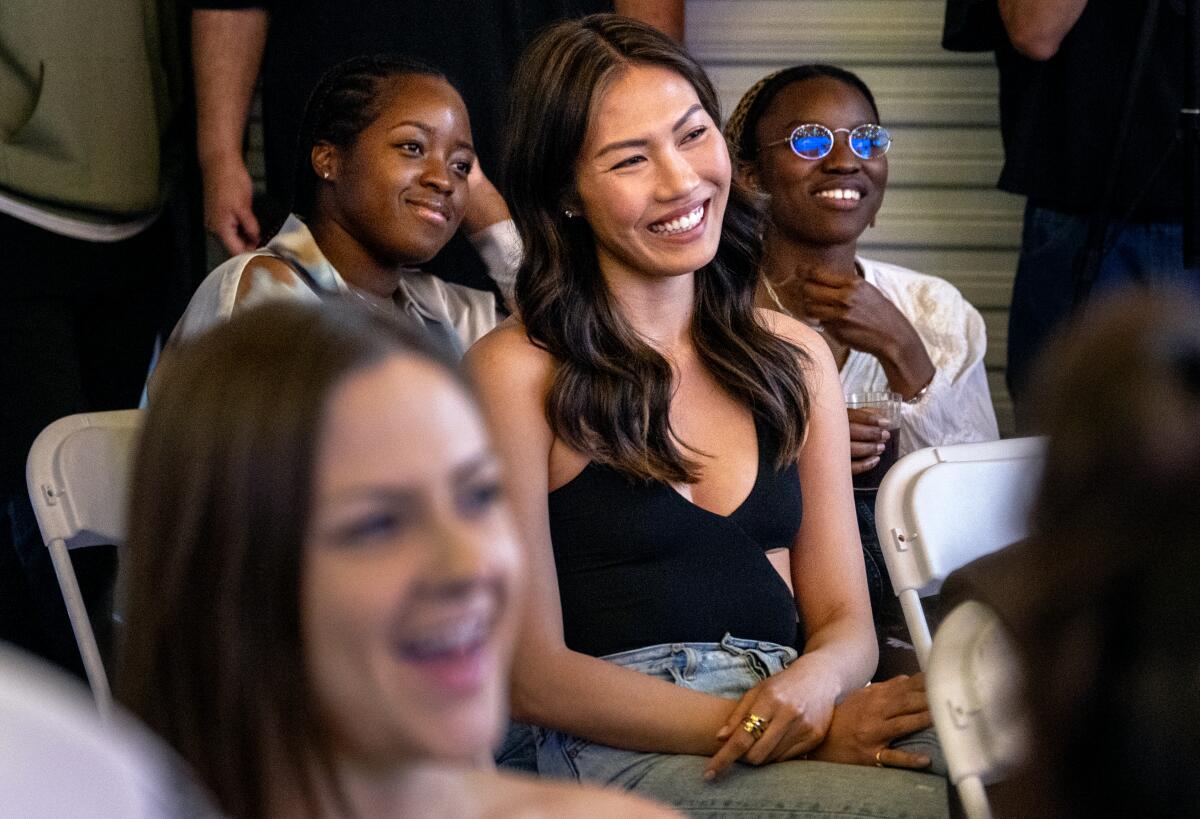
- Share via
On the same day that the Supreme Court struck down the use of affirmative action in college admissions, model Julia Lee lets off steam by attending the Midcity Comedy Show in Los Angeles.
Most of the acts are comics of color, including several who are Asian American like Lee.
The ethnic jokes in particular are self-deprecating, guilty pleasures.
Throughout the night, there are bits that poke fun at the stereotype that all Asians are scholastically gifted and overachievers.
Adam Chong, the Korean American MC, calls out a Latino man and Asian woman in the multicultural audience for some good-natured ribbing.
“I love Mexican-Asian love,” he says. “Your kids are going to look Filipino as hell.”
Julia Lee, a fashion model and social medial influencer, chuckles at the comedians’ raw humor. The show comes as a welcome reprieve from the atmosphere of foreboding that has seeped into many aspects of daily life and that has left Americans Lee’s age and younger feeling dejected and fearful.
Lee, 31, is part of a legion of newcomers to Los Angeles who’ve helped to transform the city into an epicenter for emerging online personalities in the worlds of fashion and pop culture.
But it’s hard to conduct business as usual and celebrate accomplishments such as being called “The Asian Superstar” on the cover of the L’Officiel India magazine when living in a country that’s experiencing a spike in identity-based hate crimes and a political backlash against the very thing she and other influencers of color want to encourage — brown and Black people calling out injustice, sharing of themselves and taking pride in where they come from.
With all of the recent turbulence — including the Supreme Court ending the use of racial preferences in college admissions in part on the premise that Black and brown applicants were being selected at the expense of more qualified Asian students — it seems to Lee as if the nation is growing even more divided.
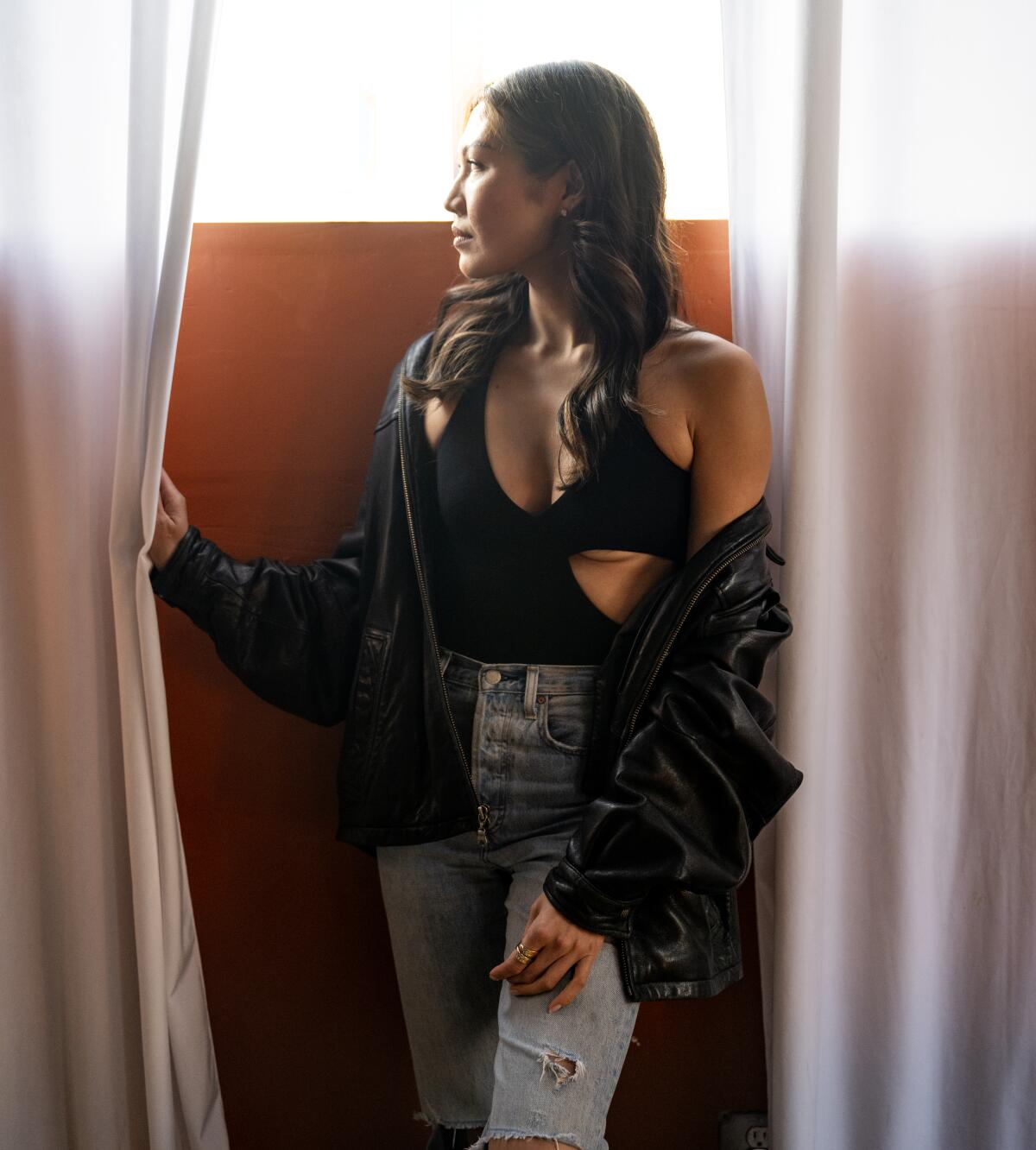
“Affirmative action, it puts me as an Asian American in a weird place,” says Lee. “I feel like the decision kind of pits Asian Americans against Latinos and Blacks, and that’s not fair. There needs to be a give and take.”
Lee was already feeling an urgency to speak out long before the court ruling.
An American with a Chinese and Vietnamese background who is no relation to the author of the same name, she’s been interspersing her lighter social media musings with reflections on race, skin color and the need to do away with European beauty standards that seem more and more out of step with the nation’s reality.
“What’s a belief that took you time to unlearn? I’ll start: My skin color defines my status and how beautiful I am,” Lee writes in a recent Instagram post to her 105,000 followers.
The U.S. has seen surges of this kind of racism before. Here’s what’s behind the latest.
The overarching problem is one that many in her community find difficult to open up about, Lee says: Asian Americans are held up as the “model minority” while being subjected to the racist attitudes that other oppressed people endure.
What’s often overlooked in the culture wars, she says, is that Asians also wrestle with daunting questions about who they are and how they fit into the nation’s reckoning over racism.
Lee was so outraged by videotaped beatings of Asians in New York that she became active in the Stop Asian Hate movement. She organized a rally against hate in that city’s Chinatown neighborhood last year, and helped plan another in that city to encourage Asian Americans to vote.
For decades, few challenged Pacific Grove’s Feast of Lanterns, even when locals wore yellowface and slanted eyes. Now some see hope for a racial reconciliation.
“I wanted to speak for people who might not be able to speak for themselves,” she says.
Bathed in the dappled sunlight of a cafe patio in Hollywood, Lee projects seriousness and a disarming radiance while reminiscing about cutting class in high school to walk in her first runway show during fashion week in Philadelphia, her hometown.
The show — which she kept secret from her parents — lighted a passion within her. While studying abroad in Milan, Italy, during college, she signed with an agency in New York, focusing primarily on working in advertising campaigns and modeling for buyers at department stores.
But something always seemed off.
She’d successfully audition for castings and wonder if she was chosen simply to check off the diversity box or because her features were truly valued?
When rejected for model castings, another kind of doubt gnawed at her: “Sometimes I felt like I wasn’t ‘Asian’ enough.”
Her confusion and frustration were aggravated by the reality that fairer complexions are more prized by some within the Asian community too, she says. Because her late immigrant father was Vietnamese, her skin is darker than the Chinese side of her family.
On a trip to Taiwan, she had to get used to people musing out loud, “Wow, her skin is so dark.”
“It was, like, a bad thing,” Lee says.
The spike in antisemitism and other hate crimes in L.A. is grim, but a Jewish neighborhood in L.A. offers glimmers of hope.
Lee says her parents didn’t discuss race, or racism, when she was younger, even though Lee’s white childhood piano teacher spent years saying that “Asians don’t know how to play the piano with feeling.”
All of these experiences have taught Lee that being Asian American is far more nuanced, and conflicted, than many of her fellow citizens realize.
“If you’re Asian American, you can relate to this,” Lee writes in another Instagram post about “trying to balance Asian and American culture.”
“I felt a sense of belonging to both, yet not fully belonging to either,” she says.
Lee welcomes the recent surge of movies, TV shows and mainstream musical acts that allow Asians to showcase themselves on their own terms. She dreams of venturing behind the camera to create and produce her own Asian-themed programming.
But the hostility hasn’t seemed to fade since former President Trump rekindled age-old, anti-Asian resentments by calling COVID-19 the “Chinese virus.”
Lee acknowledges that she was shocked when so many Americans voted for Trump in 2016. She felt naive about race relations. Seven years later, with Trump still stoking animus in his bid for a second term, she has few words to convey how disheartened she feels to continually confront the bigotry he’s unleashed.
UCLA law professor Jerry Kang, an expert in the study of institutional racism and implicit bias, says Americans like Lee shouldn’t be surprised that the pendulum appears to be swinging toward the attitudes of the past, at least for some.
The South Korea-born Kang, 55, is the university’s founding vice chancellor for equity, diversity and inclusion. He says that after decades of civil rights gains — for people of color, women and the LGBTQ+ community — many Americans are uncomfortable with the swiftness of social change.
Pomona native Victor Glover Jr.’s selection for NASA’s Artemis II moon mission isn’t just historic. His fellow Black Americans say it will change how the world sees them — and how they see themselves.
Even so, Kang, like Lee, is frustrated that people with opposing politics fail to agree on “what it means to make sure that every person fundamentally believes that they belong to the project that is America.”
That night at the comedy show, Lee says it feels good to decompress around strangers who either look like her or understand, on a deep level, what’s it like to represent both the diversity that many Americans profess to want and the complexity of your own existence.
After her father died in 2019, Lee was overcome with a longing to connect to her Southeast Asian heritage. She hopes to start that journey by visiting his native country in the near future. As a former cover model for Harper’s Vietnam, she will be recognizable to many there.
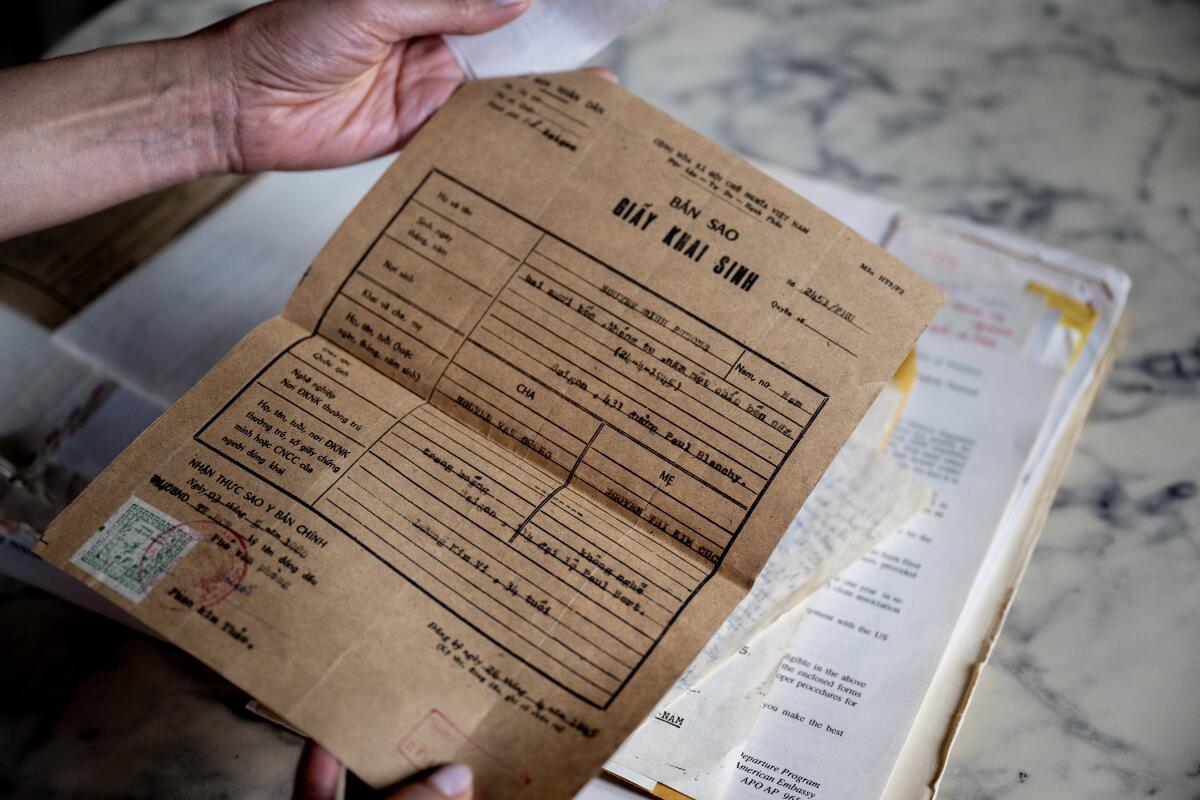
Before the show, Lee opens a folder she found in her family’s old house that sparked her curiosity. It’s stuffed with yellowing letters on thin parchment and faded immigration documents that her father and other family members preserved in the 1970s as they rushed to flee Saigon, now Ho Chi Minh City, during the U.S. pullout of Vietnam.
Lee’s father had shielded her from the world’s ills and the mixed messages that people of color often receive in American society. Somehow, she says, “he always made everything sweeter than the reality.”
While there’s no real way to sugarcoat the tensions that strain the nation’s cohesiveness, Lee says, she wants to pay tribute to her father and honor the sacrifices her parents made so that she could get the most out of being an American.
More to Read
Get the L.A. Times Politics newsletter
Deeply reported insights into legislation, politics and policy from Sacramento, Washington and beyond. In your inbox three times per week.
You may occasionally receive promotional content from the Los Angeles Times.
